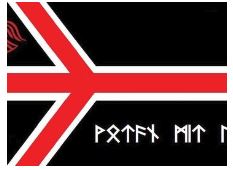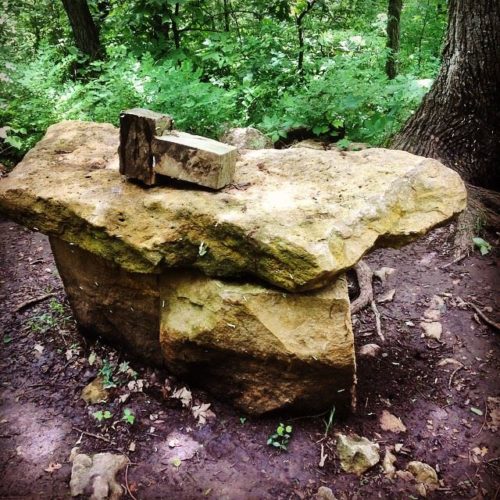![]()
Forward! And remember
To ask what our strength is worth.
In hunger and in piety:
Whose tomorrow is tomorrow?
Whose earth is the earth?
-Berthold Brecht, “Solidarity Song,” translated by Joe Grimm Feinburg in Songs of the IWW (38th ed.)
As reported by the Chattanooga Times Free Press and expanded upon by The Wild Hunt earlier this week, a folkish Heathen group, “Wotans Nation,” has purchased 44 acres of land in Meigs County, Tennessee. Wotans Nation intends to use this land as the site for an intentional Heathen community, with the stated goal of eventually becoming “the spiritual center of the Heathen religion in this nation.”

Despite that lofty ambition, the current plans for Wotans Nation sound like the designs for a commune or a Pagan nature retreat: structures for both permanent tenants and like-minded visitors to inhabit a community built on certain shared philosophies and group rituals. At the Dancing Rabbit Ecovillage, an intentional community in northeast Missouri, the philosophy is ecological sustainability and the shared rituals are timber framing workshops and cooperative singing weekends; at Oak Spirit Sanctuary, just down the road from me in Boonville, Missouri, it’s Shamanic Wicca and the cycle of esbats and sabbats.
To hear Wotans Nation tell it, “the nation” will be a place for Heathens to reconnect to the “power of nature” and to indulge their “primal instinct to return to [their] natural roots.” They claim life in Wotans Nation will involve “training programs in all aspects of natural living, theological study, ceremony, tradition, self reliance” [sic].
It is an appealing image on the surface, speaking to the desires many of us in the Pagan community feel for a way of life that improves upon the one we have. I can read parts of the Wotans Nation website and share the desires implied within its manifesto. I do feel that modern American life disenchants us from the natural world; I do feel that the bonds of community have grown weaker and weaker under the relentless pressure of neoliberal capitalism; I do long for a way of living that would let me feel more completely Heathen.
Unfortunately, as both the Times Free Press and The Wild Hunt have reported, the couple at the center of Wotans Nation, Angela and Eric Meadows, have a history with outright Nazism, having once been members of the National Socialist Movement and the League of the South. Although the website goes to great pains to avoid using the word “white” to describe the desired citizens of Wotans Nation, the language used instead makes that position clear: they view Heathenry as “traditional religious and spirituality [sic] of the indigenous Europeans that make up the majority in this nation,” a position that leaves little doubt of the connection being made between Heathenry and whiteness.
Most telling of all, the penultimate statement in their manifesto notes Wotans Nation hopes to “ensure a future for our faith, our folk and for our children” – a statement that may seem innocuous but resembles the infamous “fourteen words” of the white supremacist Odinist David Lane: “We must secure the existence of our people and a future for white children.” I suppose it is possible that the two statements only resemble one another coincidentally – but let’s not kid ourselves. Eric Meadows once hosted the “White Power Hour” internet radio program. There’s no accident here.
Wotans Nation claims, in its most recent blog post, that it takes no political stances and endorses no political parties, that it is a purely theological organization. Such a statement in itself is a smokescreen, an attempt to obscure that theology cannot help but be political. Perhaps the founders of Wotans Nation no longer openly endorse Nazism, but their theology has white supremacy at its heart; it can’t help but reflect those politics, regardless of their claims to the contrary.
All that said, it should not be surprising to us at this point that there is a racist current in Heathenry, nor that racist Heathens would avail themselves of the opportunity to make a separatist commune in the United States. There have been plenty of attempts to create these kinds of projects in America, including many from both the Pagan and the racist wavelengths that Wotans Nation draws upon; in that sense, there isn’t much novel about this project, save for its mixture of the two currents.
One instinctive response to this story would be to declare the entire idea behind Wotans Nation to be “not us,” a foreign concept that bears no relationship to “true Heathenry.” That was certainly my first reaction. But I think it’s a disingenuous response. For one thing, we can’t just declare something “not Heathen” because it horrifies us – to do so absolves us of the responsibility to counter those elements within our religion. It lets us pretend that there is no relationship between the overt white supremacists and the rest of us, which is precisely the dynamic that allows white supremacy to maintain its grasp on the broader American culture. The truth is that developments like Wotans Nation are very much a part of Heathenry, and very much a part of Paganism in general; my personal revulsion to racism in Heathenry does not excuse me from having a responsibility to acknowledge and fight back against it. Quite the opposite.

The altar beside Forn Halr at Gaea Retreat [Eric Scott].
Pagan land is a beautiful idea – a place to be free, to build communities that provide an alternative to the alienation forced on us by modernity. Wotans Nation, it must be said, would indeed provide such an alternative – but one that responds to disaffection with only further domination.
* * *
The views and opinions expressed by our diverse panel of columnists and guest writers represent the many diverging perspectives held within the global Pagan, Heathen and polytheist communities, but do not necessarily reflect the views of The Wild Hunt Inc. or its management.
The Wild Hunt is not responsible for links to external content.
To join a conversation on this post:
Visit our The Wild Hunt subreddit! Point your favorite browser to https://www.reddit.com/r/The_Wild_Hunt_News/, then click “JOIN”. Make sure to click the bell, too, to be notified of new articles posted to our subreddit.